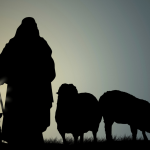In New Orleans and Rio, today is Mardi Gras. Elsewhere, folks call it Fat Tuesday or Pancake Tuesday because, traditionally, the idea was to consume decadent foods such as sugar, fat and white flour before the 40-day fast begins on Ash Wednesday — the first day of Lent.
The Anglican tradition calls today Shrove Tuesday. “To shrive” is an old-timey English word that means to hear someone’s confession — an accounting of someone’s sins — followed by dispensing spiritual advice and assuring the confessor that he or she is loved by God.
Being “shrove” today, especially considering the moderation that these lean times seems to call for, is probably a better plan for your soul (and your waistline) than gorging on catfish po’ boys and super-sized rum hurricanes.
In her sermon Sunday, Mother Katie, one of the priests at our Episcopal parish, talked about the typical approaches of marking the Lenten fast by either giving something up or adding a new spiritual practice. Whether we add or subtract is up to us, she said, and we should choose something that honestly will help us focus on shaping the spirit (and not just taming the flesh).
“How can you mark this time before Easter as a special time of year, a time to examine your life and what controls it,” Mother Katie asked. “What will help you proclaim to others that you have and . . . are listening to the world around you?”
She also talked about the fleeting, glorious moments the Celts called “thin moments,” in which the veil between this world and the spirit world seems almost transparent. These are the times when God reaches God’s hands into the world and tries to get our attention.
“We are called to listen,” Mother Katie said, “to look at the world as it is, not just as we would have it to be.”
This reminded me of a conversation I had last week with The Rabbi, a voice longtime readers of this column might remember. His real name is Rabbi Irwin Kula, and, since we met six years ago, he has become a powerful force in my spiritual life. I often turn to him with confounding questions, such as: “What do you say to someone who feels like God hasn’t provided and isn’t going to?” When I asked The Rabbi just that, he said we need to think about who we really are.
“By that, I mean, when you watch the news — paralyzing news of depression and recession and wars — every single day from the first moment you get up until you turn it off at night or get off the Internet, it’s very easy to forget who you really are,” The Rabbi said. “Most Americans have not lost their homes. Most Americans still have what it is we most basically need, and that puts us in a whole different place than most of the rest of the planet. People can help other people. That’s how you find out you actually have more than you could have imagined. From a penny to a minute, you can give something.”
Realizing this, The Rabbi says, is a “burning-bush moment.” Like Moses on Mt. Sinai, who could have walked by the burning bramble had he been distracted by all the drama surrounding him, we, too, will miss out if we’re not paying attention.
As soon as I decided to add flaming-bush-spotting as my Lenten spiritual practice, I spotted one. In an ad in the church bulletin for a book club, I noticed the name Dianne Hunter. My husband and I are relatively new to this parish. We know a few people, but there are many we have yet to meet. While I didn’t have a face for it, this name was familiar.
Dianne Hunter is public relations director for Mount Sinai Hospital in Chicago. More important, she is the woman who came forward in November 2007, when I first wrote about Vasco Sylvester, the little boy from Malawi who needs life-saving heart surgery, to offer her help. In short order, she organized doctors from three Chicago hospitals to donate their time and expertise to treat Vasco for free.
I had never met Dianne, though we’ve talked on the phone and by e-mail dozens of times. She’s a significant reason why Vasco will come to Chicago this spring for the surgery that will change his life.
The church-book-club Dianne Hunter and Vasco’s angel Dianne Hunter turned out to be the same person. We had been worshipping side by side for months and never knew it, until someone peeled back a corner of the veil.
The Rabbi would call that a burning-bush moment. Mother Katie might call it a thin moment. Dianne and I called it a God moment.
This Lent, I’ll be keeping my eyes wide open, scanning the perimeter for more smoke signals.
A short update on Vasco
Plans for Vasco’s journey to Chicago have gathered momentum, thanks in large part to the generosity of Sun-Times readers who have offered to help in numerous ways and have donated close to $4,000 to his trust fund in the last month alone. The biggest hurdle is air fare from Malawi to Chicago and back for Vasco and his traveling companion/ guardian, Mac. It’s about $10,000 — but we’re talking to several airlines and remain hopeful the cost will be covered somehow.
We expect Vasco and Mac to be in Chicago by the end of April. We’ll keep you updated here and at The Dude Abides.
How you can help
The Chicago Sun-Times has set up a fund to offset the cost of Vasco’s journey to Chicago for treatment.
Checks should be made out to the Chicago Sun-Times Charity Trust, with “Vasco’s heart” in the memo field.
They should be mailed to: Vasco’s Heart, c/o Chicago Sun-Times Charity Trust, 350 N. Orleans, Chicago, IL 60654















